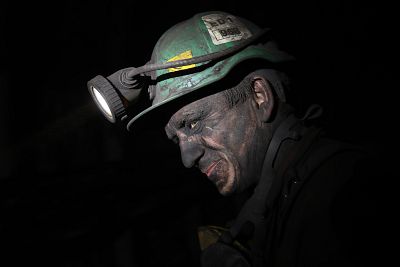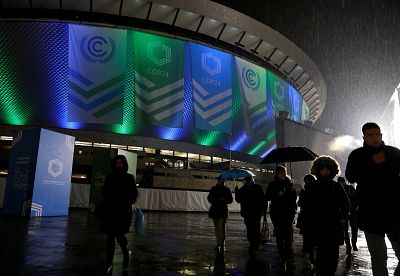The World Bank Group announced it is doubling funding for poor countries preparing for climate change to $200 billion over five years.
KATOWICE, Poland — Leaders from around the world arrived Monday for ceremonial opening of the United Nations' annual climate change conference in a Polish city built around mining coal, widely seen as a main culprit behind global warming.
 ADVERTISEMENT
ADVERTISEMENT
 ADVERTISEMENT
ADVERTISEMENT
The conference in Katowice is expected to work out how governments can report on their efforts to reduce green gas emission and keep global warming well below 3.6 degrees Fahrenheit, as agreed in 2015 in Paris.
Environment
Arriving for two weeks of talks on tackling climate change, conference participants cast off hats, scarves and heavy coats as they entered cavernous halls in Katowice heated by coal-fired power plants nearby.
Coal is center-stage at the U.N. summit.
While the Polish government claims Katowice is in the process of transforming into a green city, power plant chimneys pumped plumes of smoke into a dull December sky and monitoring sites showed elevated levels of air pollution.
Poland, which is presiding over the meeting, plans to use Monday's official opening event to promote a declaration calling for a "just transition" for fossil fuel industries that face cuts and closures amid efforts to reduce greenhouse gas emissions.
Environmental activists have expressed concerns about the non-binding declaration, arguing that it could be cited as justification for propping up dying industries instead of investing in renewable energy sources. Some also have questioned why coal companies are among the meeting's sponsors.
"There is no Plan B."
Poland's deputy environment minister, Michal Kurtyka, who is chairing the conference, urged envoys from almost 200 nations to use the time between Sunday and Dec. 14 to make progress on fleshing out the 2015 Paris agreement.
"We are here to enable the world to act together on climate change," he said. With further meetings next year meant to build on what's decided in Katowice, Kurtyka urged all countries to "show creativity and flexibility."
"The United Nations secretary-general is counting on us, all of us to deliver," he added. "There is no Plan B."
The World Bank Group said Monday it is doubling funding for poor countries preparing for climate change to $200 billion over five years. It said about $50 billion will be earmarked for climate adaptation, a recognition that some adverse effects of global warming can't be avoided anymore but require a change in practice.
The meeting, known as COP24, received a boost over the weekend when 19 major economies at the G-20 summit affirmed their commitment to the Paris accord. The only holdout was the United States, which announced under President Donald Trump that it is withdrawing from the climate pact.
"Despite geopolitical instability, the climate consensus is proving highly resilient," said Christiana Figueres, a former head of the U.N. climate office.
"It is sad that the federal administration of the United States, a country that is increasingly feeling the full force of climate impacts, continues to refuse to listen to the objective voice of science when it comes to climate change," Figures said.
While the United States is withdrawing from the climate pact, the State Department said it is sending a delegation to the Katowice conference.
Environment
The meeting in Katowice is regarded as a key test of countries' willingness to back their lofty but distant goals with concrete measures, some of which are already drawing fierce protests . At the top of the agenda is the so-called Paris rulebook , which will determine how governments record and report their greenhouse emissions and efforts to cut them.
Separately, negotiators will discuss ramping up countries' national emissions targets after 2020, and financial support for poor nations that are struggling to adapt to climate change.
The shift away from fossil fuels, which scientists say has to happen by 2050, is expected to require a major overhaul of world economies.
"The good news is that we do know a lot of what we need to be able to do to get there," said David Waskow of the World Resources Institute.












